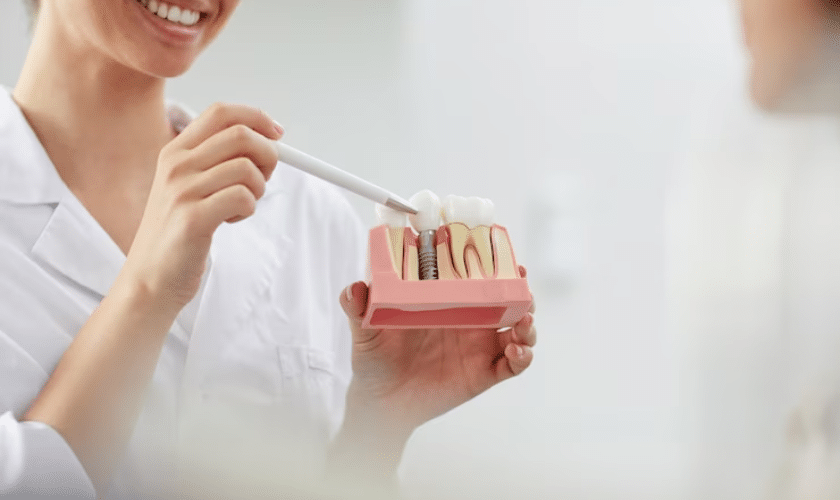Embarking on the journey of dental implant surgery signals a transformative step toward regaining a confident and fully functional smile. As you traverse this path, understanding the recovery process is crucial for a smooth and successful outcome. In this guide, we’ll walk you through the tips and timeline of recovering from dental implant surgery, ensuring you’re well-prepared for every phase of the healing journey.
Understanding Dental Implant Surgery: A Brief Overview
Before delving into the recovery process, let’s briefly understand what dental implant surgery entails. Dental implants are artificial tooth roots surgically implanted into the jawbone to support replacement teeth. This procedure is a popular and effective solution for individuals with missing teeth, offering a long-lasting and natural-looking smile.
Dental implant surgery is a transformative and advanced procedure designed to replace missing teeth with a permanent and natural-looking solution. The process involves the surgical placement of artificial tooth roots, commonly made of titanium, into the jawbone. This serves as a sturdy foundation for attaching prosthetic teeth or crowns. The surgery itself is typically performed in stages and requires the expertise of an oral surgeon or a qualified dental professional.
Recovery Timeline: What to Expect
Day 1-2: The Initial Phase
Your first two days post-surgery are crucial for setting the foundation for a smooth recovery. Expect some swelling and discomfort, which can be managed with prescribed medications. Stick to soft foods, maintain a strict oral hygiene routine, and avoid strenuous activities.
Day 3-7: Navigating the First Week
As you move into the first week, you’ll likely experience a reduction in swelling. Stick to a soft diet, continue with prescribed medications, and attend any follow-up appointments scheduled by your oral surgeon. Be gentle with your oral care routine, avoiding direct contact with the implant site.
Week 2-4: Healing Takes Center Stage
During weeks two to four, your focus shifts to allowing the implant site to heal. Gradually reintroduce firmer foods, but continue avoiding anything too hard or crunchy. Follow your oral surgeon’s instructions regarding oral hygiene and any recommended lifestyle modifications.
Month 1-3: Implant Integration
The three-month mark is a significant milestone as your dental implant begins to integrate with the jawbone, a process known as osseointegration. Your oral surgeon may schedule periodic check-ups to monitor progress. Continue practicing good oral hygiene and gradually reintroduce your regular diet.
Months 3-6: Progress and Adjustments
Months three to six mark a period of continued healing and potential adjustments. Your oral surgeon may recommend modifications to your oral care routine or make adjustments to the replacement teeth. Regular check-ups are crucial during this phase to ensure everything is progressing as planned.
Beyond Six Months: Finalizing the Process
Beyond the six-month mark, most individuals have fully recovered, and their dental implants have been successfully integrated. Your oral surgeon may recommend periodic check-ups, but you can generally resume your normal oral hygiene routine and diet.
Tips for a Successful Recovery
Follow Prescribed Medications: Stick to the medications prescribed by your oral surgeon to manage pain and reduce the risk of infection. Your oral surgeon will likely prescribe medications to manage pain, reduce inflammation, and prevent infection. It is crucial to follow the prescribed dosage and schedule diligently. If you experience any unexpected side effects, promptly consult your oral surgeon.
Maintain Oral Hygiene: Adhere to a meticulous oral hygiene routine, but be gentle around the implant site. Use a soft-bristled toothbrush and follow any specific instructions provided by your oral surgeon. Gently clean the area, avoiding excessive pressure that could disrupt the healing process.
Dietary Considerations: Initially, stick to a soft-food diet, gradually reintroducing firmer foods as advised. Avoid extremely hot or cold items and stay hydrated. As your recovery progresses, gradually reintroduce firmer foods. Avoid extremely hot or cold items, and stay hydrated to promote overall healing.
Rest and Avoid Strenuous Activities: Allow your body to heal by getting adequate rest. Avoid strenuous physical activities, especially in the initial days post-surgery. Rest is instrumental in the healing process and helps minimize the risk of complications.
Attend Follow-Up Appointments: Regular follow-up appointments with your oral surgeon are not mere formalities; they are integral to monitoring your progress. These appointments allow the surgeon to assess the healing process, address any concerns, and make adjustments as needed. Attend all scheduled check-ups to ensure the best possible outcome.
Embarking on the recovery journey after dental implant surgery requires patience, dedication, and adherence to professional guidance. By understanding the timeline and implementing these tips, you’re well on your way to achieving a successful and seamless recovery. Your commitment to post-surgical care is key to unveiling a restored and radiant smile that will last a lifetime.
FAQs
- How long does the recovery process take after dental implant surgery?
Ans: Recovery typically spans several months, with the initial healing phase lasting around one to two weeks and the full integration of the implant taking three to six months.
- What can I eat after dental implant surgery?
Ans: Initially, stick to soft foods like soups, yogurt, and mashed potatoes. Gradually reintroduce firmer foods as advised by your oral surgeon.
- Is pain normal after dental implant surgery?
Ans: Some discomfort and swelling are normal in the first few days. Your oral surgeon will prescribe medications to manage pain and reduce the risk of infection.
- Can I resume regular oral hygiene immediately after surgery?
Ans: While oral hygiene is crucial, be gentle around the implant site. Use a soft-bristled toothbrush and follow any specific instructions provided by your oral surgeon.
- When can I expect my replacement teeth to be placed?
Ans: The timeline for placing replacement teeth varies, but it often occurs after the three-month mark when the implant has successfully integrated with the jawbone. Your oral surgeon will guide you on the appropriate timing for this step.




